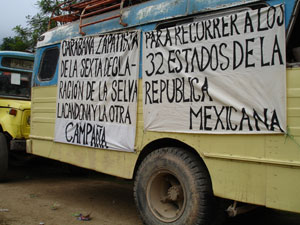January 1, 2006
 January 1, 2006
January 1, 2006The Sup, Subdelegado O that is, left the jungle today on a motorcycle, unarmed and unprotected by anything other than the support of what the Zapatistas have always called “civil society.” In the caravan that followed him we could barely keep up with the pace he set, weaving through the rocks and potholes of the rough dirt road that requires two hours of jaw-rattling driving from La Garrucha to the highway in Ocosingo. On the back of the motorcycle rides “El Pinguino,” the new EZ mascot, a crippled chicken-turned-penguin that walks upright, in part per its disabled leg but more importantly, the EZ insists, per one’s right and desire to choose or self-determine what one wants to be.
That Marcos leaves the jungle as a “delegado” rather than a comandante is important: the EZLN has sent him not as a soldier or a military spokesperson, but as a kind of scout for the Sexta, sent to explore the territory for a new campaign that is political, public, pacifistic. The Sup still wears his pasamonta~as—this is still not about the man, any man, under the mask. Marcos is something we have all created, a result of global Zapatismo, a collectively generated figure produced from the interactions of the EZ with a global public. The humble chicken/penguin mascot, the insistence on “subdelegado” rather than “subcomandante”, the lack of military fanfare, ceremony, or security around Marcos, all contribute to the EZ’s message and purpose in sending the delegado first—neither he nor we are your leaders, commanders, or campaign incumbents, we are trying to be a bridge, not only between you and us but to help you, in the plural, to meet each other. Like the example we, as Kilombo, posed in our letter of response to the Sexta, this first part of the “Otra” is like the musicians of the Colombian vallenato, that travel village to village accumulating stories and converting them into a song to sing in the next village, sharing and circulating the news and experiences, and in the case of the Sexta, the struggles, and creating a web of shared knowledge without a centralization of information.
It should be understood that this departure, this shift in strategy of struggle is an enormous risk. It is a military risk to the Zapatista communities for the EZ commanders to leave the jungle, although insurgents remain, organized, trained and ready to defend the communities, in the mountains. It is a physical risk to Marcos, to emerge unarmed and unprotected into society, in plain site and range of a government and a state military upon which he, as a commander in an insurgent guerrilla army, declared war twelve years ago. But most of all it is a political risk. What they have built from behind the masks, in the clandestinity of the mountains and the jungle, what they have built in community assemblies, in the Juntas de Buen Gobierno, in their words and their silences, in communiqués to and encounters with the “civil society”, has put them in a position of international recognition and respect, given them a prominence within the global anti-capitalist movement, created a local, sustainable, resistance and a functioning autonomy, and provided a certain stability or security upheld by those constructions. National and International civil society had gotten comfortable with Zapatista modes and manners of existence, always ready to denounce aggressions against the communities, to support the construction of autonomy in Chiapas, to send aid—manual, monetary, material—when needed. But the Zapatistas refuse to be static, they refuse to be the object of anyone else’s politics, to sit on anyone’s pedestal, to fulfill expectations, to do what is expected of them. They refuse to let power pile up, they are constantly shifting the terms of the game, the terms of involvement, the circulation of power so that it may not accumulate. They keep changing the path, walking a new direction, trying a new talk, teaching us a new word, a new concept of the global, of the common, of the created.
Persecution is a risk, but perhaps the bigger risk is that “civil society” will not hold up its end of the bargain once the mountain mystique is gone, that it will not mobilize itself for itself, to be a mass movement instead of supporting one. The Zapatista refusal to be contained to Chiapas is a both an incredible vulnerability and an incredible strength. But they can’t do it alone.
Andres Manuel Lopez Obrador, the “leftist” PRD candidate and frontrunner for the 2006 presidential elections that the Zapatistas have harshly denounced, may have granted the indigenous communities “autonomous” rights, if elected. But those rights would stay in Chiapas, contained in "indigenous territory," managed and legislated out from the centers of power into these small, self-determined communities that, while inspirational, would maintain their distance from the world and retain their marginality, whether it be an oppressive, privileged, or merely isolated margin. They will not be that margin, that contained space, that particular. Autonomy is not just for the indigenous Marcos has said over and over. And now they will prove it. You can participate directly in this struggle, they say to civil society, or you can distance yourself from what we do next. You can remain in the aura of that political moment, or you can do politics, which always refers to the present. You can stick to supporting the indigenous fight, thanks for your help, or you can join us and fight for yourselves.
As the Subdelegado O states this first night of the Sexta, this new strategy of struggle, upon addressing the thousands gathered in the plaza in San Cristobal de las Casas, “You have always told us, 'No estan solos,' that we were not alone. Well now we say, neither are you.”

0 Comments:
Post a Comment
<< Home